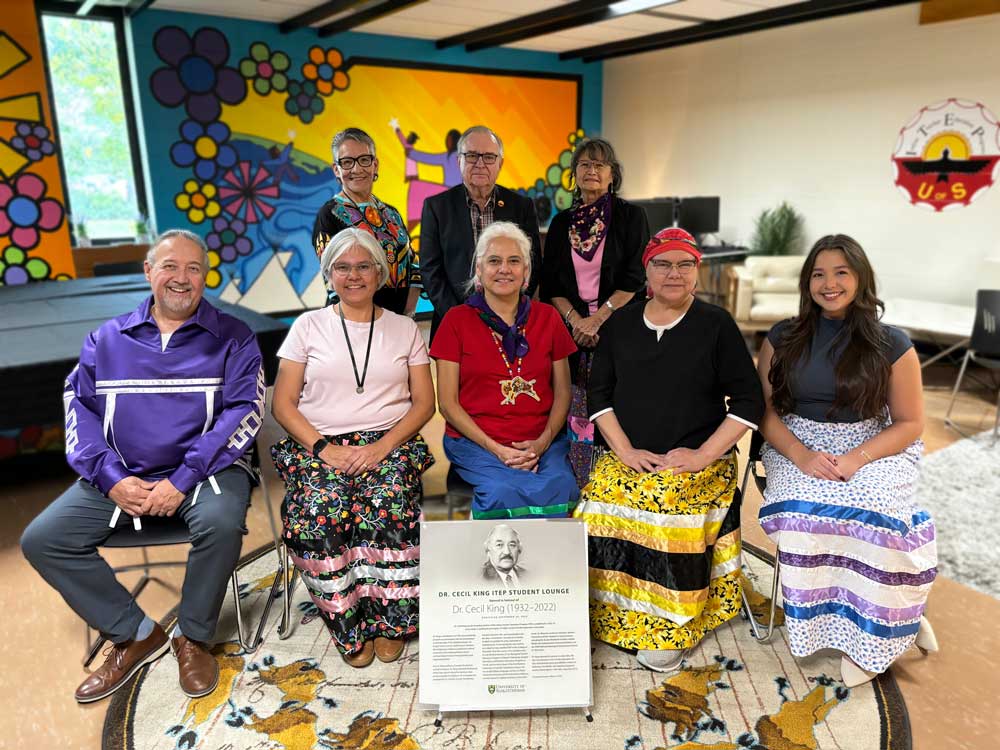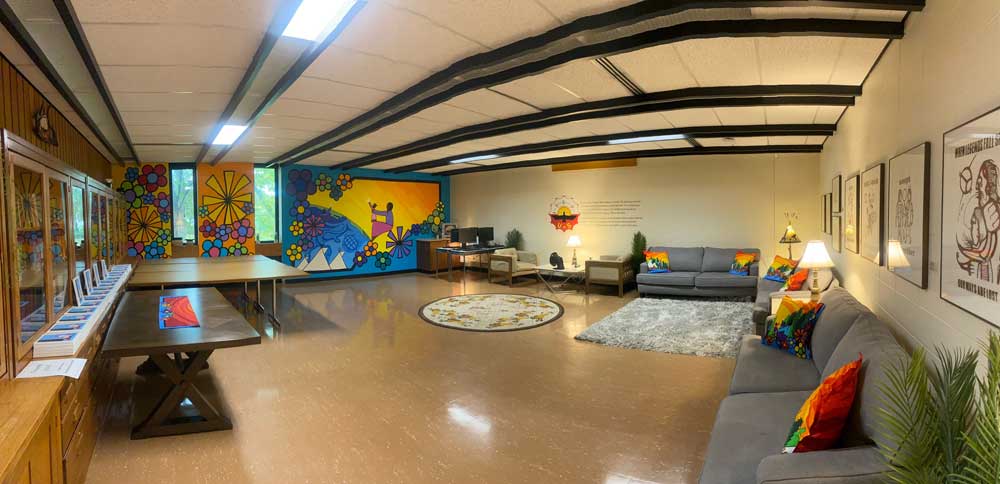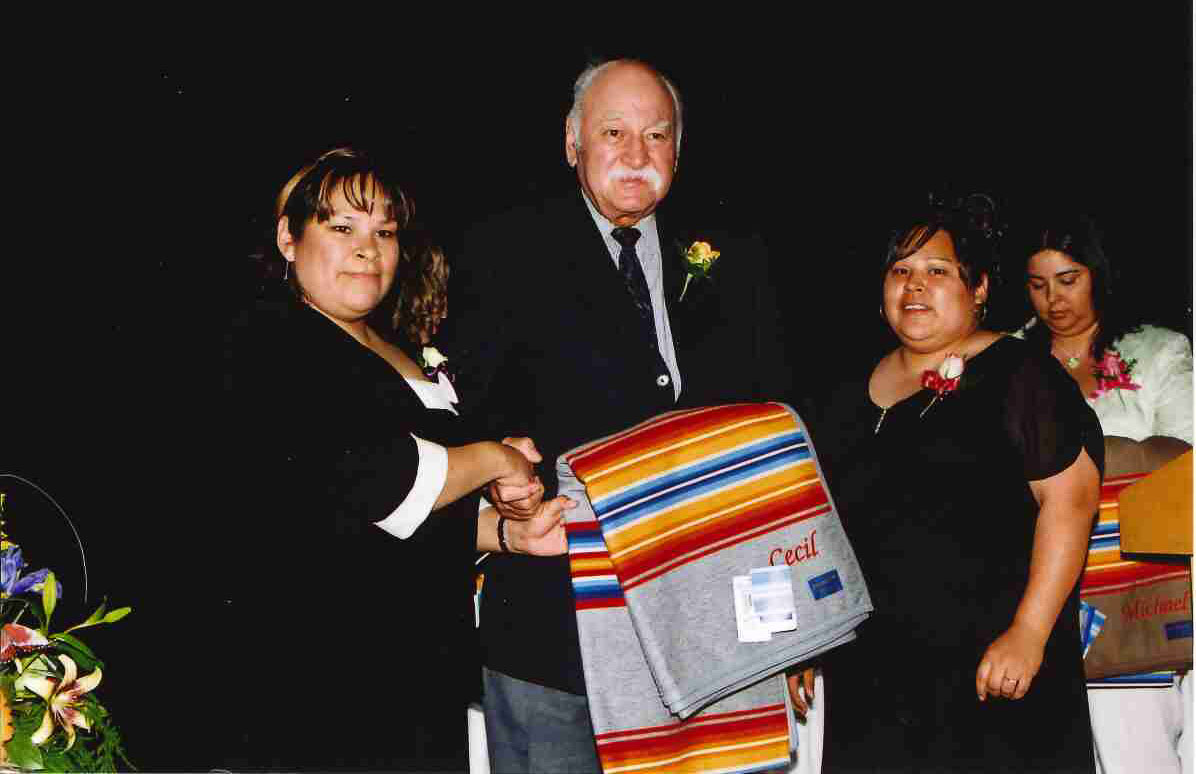
Student lounge named in honour of the late Dr. Cecil King
Dr. Cecil King (PhD) was a pioneer in First Nations teacher education throughout Canada and the founding director of the Indian Teacher Education Program (ITEP) at the University of Saskatchewan (USask). He passed away on May 4, 2022 at the age of 90.
By Meagan Hinther
“From the early days of ITEP over 50 years ago, our mission has been fostering the success of our students and giving them a space to connect to their culture and teachings,” said Yvette Arcand, director of the program, “It seems particularly fitting to name our student lounge after someone who dedicated their life to that mission and to ITEP’s founding principle of ‘Indian Control of Indian Education’.”
The ITEP student lounge located in the College of Education was reopened as the Dr. Cecil King ITEP Student Lounge on Friday, September 20.
King was born into the Odawa Nation on Wikwemikong Unceded Territory on Manitoulin Island in Ontario. As a child, he attended the Buzwah Indian Day School where his teachers were predominantly First Nations. These experiences help shape his belief that Indigenous students could thrive in the presence of Indigenous educators, leaders and mentors.
For high school, King was taken to attend St. Charles Garnier Residential School. He described his residential school experience as one where his language, history and stories were suppressed and marginalized. At graduation, King was the class valedictorian.
After 18 years as a teacher and administrator spanning remote First Nations and urban provincial schools, King moved to Saskatchewan in 1971 to complete his Bachelor of Education and Master of Education degrees at USask. During this time, he was approached by the Federation of Saskatchewan Indians to become the first director of ITEP and help implement the program. He chronicled this experience in his 2022 memoir titled The Boy from Buzwah: A Life in Indian Education.
“As I found out, it was my job to develop a program that would produce graduates to fulfill the expectations of the chiefs. The chiefs put a few more guidelines in place and were adamant that the Indian graduates get the same certification as all other teachers,” wrote King. “Therefore, the new task was to design, develop, and implement a program that produced Indian teachers who received the same credentials as other Saskatchewan teachers but who were equipped to change the education of Indian children in the province in accord with the wishes of the chiefs, communities, and parents while preparing children for their place in society.”
In 1975, King left Saskatchewan to begin doctoral studies at the University of Calgary. He returned two years later to a faculty position in the College of Education. Throughout his career, he headed the Indian and Northern Education Program at USask and was the first director of the Aboriginal Teacher Education Program at Queen’s University where he retired as professor emeritus in 1997. In retirement he moved back to Saskatoon to take on the deanship of First Nations University of Canada – Saskatoon Campus before eventually making his way back to ITEP as academic Elder-in-Residence.
Orest Murawsky, ITEP director from the mid-seventies to 2015, spoke of King’s impact and legacy at the opening event.
“Cecil meant so much to ITEP. When you have a founder—a father—of a family or group, you have strength. And we had strength in ITEP with the people that supported us,” said Murawsky. “Cecil never quit supporting ITEP, even though he took on so many roles and so many positions and was honoured in so many ways.”
Murawsky also highlighted how King dedicated his life to reconnecting to his language. He taught Ojibwe courses at USask, Stanford University and the University of Alberta, and developed an Ojibwe dictionary with 8,000 words. He specialized in curriculum development for First Nations schools, First Nations language teaching, research and methodology and Ojibwe culture, language and history.
“Cecil was a mentor, a leader, an academic, an Elder-in-Residence, a Knowledge Keeper, a Language Keeper, a director, a department head, and an author,” said Murawsky. “My goodness if you haven’t read his memoir, get at it because if you want to have reconciliation [you need to] understand what the man has said in reference to what it was like and what it has to be for the future.”
King had five children with Virginia (née Pitawanakwat) King – Denise, Daryl, Anna-Leah, Alanis, and Shoo-Shoo (Tanya). His daughters Dr. Anna-Leah King (PhD), Alanis King and Shoo-Shoo (Tanya) King-Maracle travelled to Saskatoon from Regina and Ontario to attend the event. Shoo-Shoo was joined by her husband Troy and daughter B’Elanna from Tyendinaga Mohawk Territory. Alanis and her partner Bitsy travelled from Ottawa.
A faculty member in education at the University of Regina, Anna-Leah spoke of her father’s legacy in her remarks.
“My dad lived in the time of revolution. I’ve had a chance at the University of Regina to remind people of that history, that there was a serious contingent of Indigenous educators and workers who wanted a better dream for their students,” said Anna-Leah. “They could see how the white system was eroding the culture and language and changing the kids. They wanted to go back to the traditional teachings, to the language, to all that was important to us. And why couldn’t we fight in our country, on our own land, to be the people that we were meant to be?”
Over the last year, the ITEP Student Lounge has been revitalized with fresh paint, new furniture, and visual pieces that recognize King’s legacy. Celebrated Indigenous artist Kevin Pee-ace painted a mural that complements a quote from King’s memoir. Last spring, ITEP students worked with him to paint portions of the mural.
College of Education professor emerita Dr. Marie Battiste (PhD) donated artwork by Indigenous artists Blake Debassige and Martin Panamick, both from Manitoulin Island like the King family. This art has been catalogued by University Archives and Special Collections and now hangs on the walls of the lounge.
“We were able to open a space that is welcoming to our students where they can feel the presence of Dr. Cecil King to elevate them and where they are reminded to infuse their culture with their academic success,” said Arcand.
Second-year ITEP student Serenity Gamble agrees. Recently elected youth representative for the Federation of Sovereign Indigenous Nations, Gamble spoke of the importance of the lounge to the students at the grand opening.
“The student lounge is a perfect place for students to be themselves, make connections with their cohorts, and meet for student council. There’s always laughter, long talks, auntie and uncle laughs,” shared Gamble. “Dr Cecil King holds a powerful gift to Indigenous people. That is the gift that we have with academic Indigenous ways of being.”
King’s legacy will be further celebrated at ITEP Graduation this June with the Dr. Cecil King Memorial Award.
“Cecil’s wife Dr. Catherine Littlejohn King passed away 8 months after him. In her will, Cathy wanted to acknowledge her husband’s contributions to ITEP by providing a scholarship that bears his name,” Arcand said. “The award recognizes students who aspire to use the sacred teachings of the Seven Grandfathers and their own language as sources of inspiration and ways of sharing with their future students.”
-30-
To contribute to the Dr. Cecil King Memorial Award, click here. (Area: Education, indicate Dr. Cecil King Memorial Award in the comments section).
Dr. Cecil King’s family followed in his footsteps with many pursuing post-secondary education. Son Daryl has advanced level certification in public administration and governance; his son Cheyenne King completed a degree in law and justice. Denise’s daughters Candace and Feather Maracle hold a Master of Journalism degree from Toronto Metropolitan University and a BA degree from the University of Toronto, respectively. Feather is currently pursuing a MLIS through Western University. Anna-Leah received her BEd and MEd degrees from the University of Saskatchewan and her PhD from the University of Alberta. Her daughter Tanis completed her BSc, MPH and MD degrees from the University of British Columbia. In 1986, Alanis King was the first Indigenous woman to graduate from the National Theatre School of Canada. Shoo-Shoo King-Maracle received her BA from Toronto Metropolitan University and her MPA from Queen’s University. Her daughter B’Elanna Maracle holds a BSc degree from Western University.

Together, we will work towards Truth and Reconciliation. We invite you to join by supporting Indigenous achievement at USask.
Article re-posted on .
View original article.

